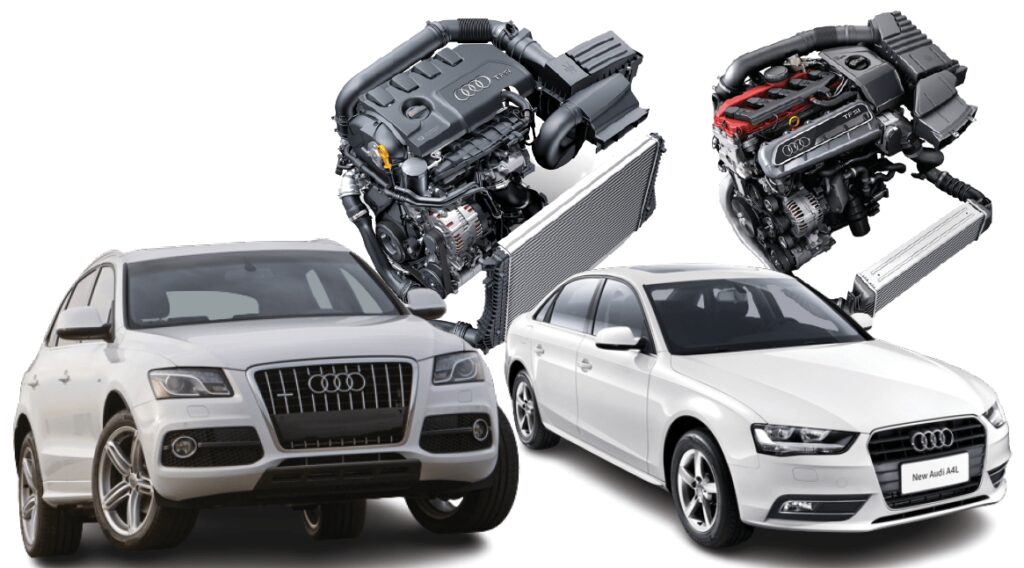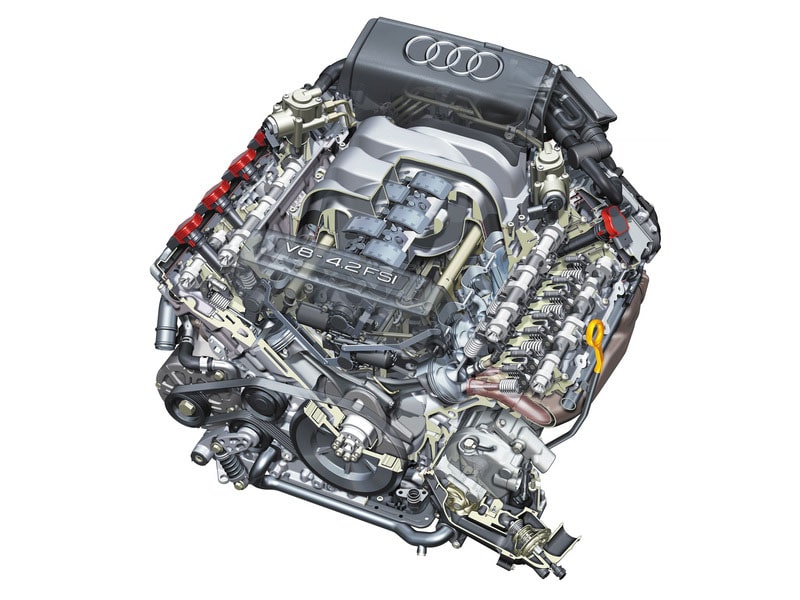5 Audi engines to avoid - They break you financially
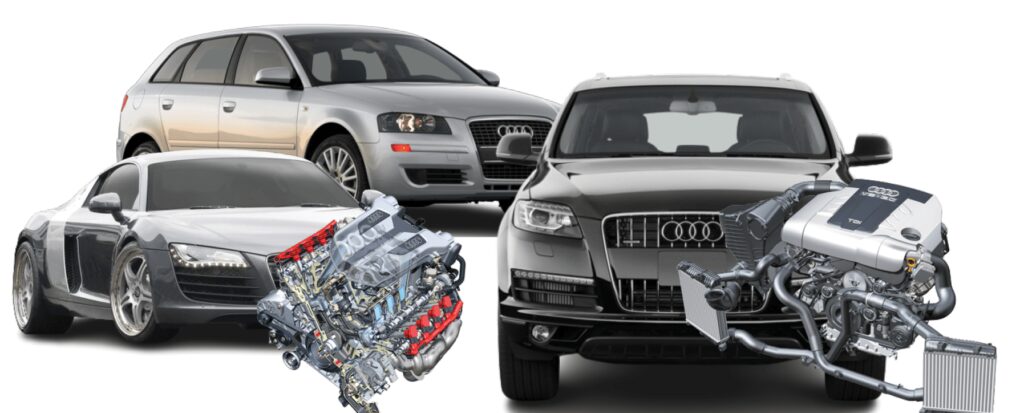
Before we dive deep into the list of Audi engines to avoid let’s bring forth some facts and bitter pills about Audis.
To own an Audi, you need a lot of money, good luck, and dedication.
Fact: Audi makes beautiful vehicles, but you might want to stick around for our discussion of Audi engines that have a bad reputation for being unreliable or prone to problems, and why they should be avoided.
Whether you’re looking for a new or used Audi, knowing the potential issues with specific engines can help you make an informed decision and avoid costly mistakes later on. So, let’s take a look at what Audi engines to avoid.
Let’s get into it…..
Audi engines to avoid - 1.8L
The Audi 1.8L engine is a compact power plant that has long been a part of the Audi lineup. First introduced in the mid-1990s, this engine has undergone several revisions and improvements over the years to reliability issues.
The Audi 1.8L engine is a four-cylinder gasoline engine that comes in turbocharged and non-turbocharged versions, with power output ranging from 125 to over 225 horsepower.
Notable features of the 1.8L engine
Here are some of the highlights of the Audi 1.8L engine:
- Direct fuel injection provides greater control over the fuel-air mixture, to aid in engine performance optimization.
- The Audi 1.8L engine has been designed to be as light as possible, which aids in handling and overall performance.
- Variable valve timing, which gives the engine’s performance more control
This engine has a few flaws despite having extremely remarkable features.
1.8L Engine Problems
Oil sludge buildup is one of the 1.8L engine’s most frequent problems. This happens when the engine’s oil is not properly circulating, which can cause sludge to build up in the oil pan and oil channels. If left untreated, this may result in decreased engine performance as well as possible engine damage.
This engine’s ignition coils have a history of failing, resulting in misfires and poor engine performance. Failed ignition coils have also been linked to engine damage.
Coolant leaks are another issue with the 1.8L engine. Coolant leaks from the water pump and thermostat housing are common causes of engine overheating and, if not addressed, engine damage.
The turbocharged 1.8L engine is also prone to turbo problems. The turbochargers in this engine have been known to fail as a result of oil starvation, resulting in decreased engine performance and potential engine damage.
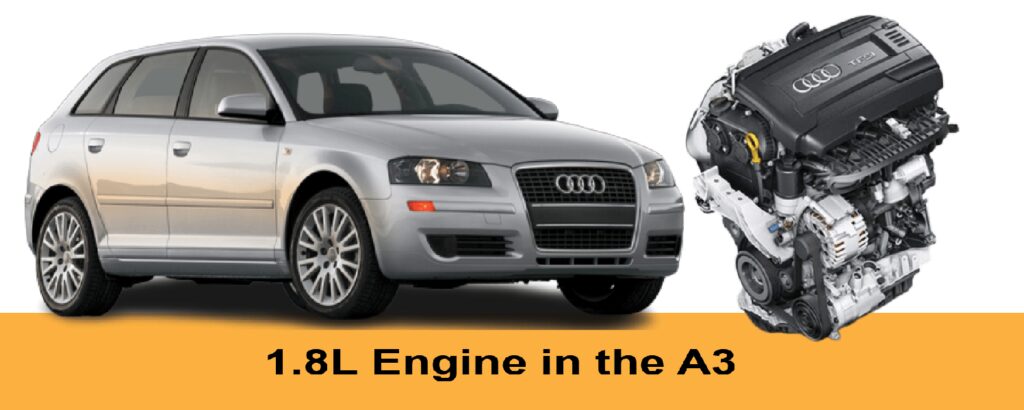
Audi vehicles using the 1.8L engine
Audi A3 – The first-generation A3 was offered with a 1.8L turbocharged engine
Audi A4 – Over the years, the 1.8L engine has been offered in a variety of configurations, ranging from naturally aspirated to turbocharged.
Audi TT – The first-generation TT was offered with a 1.8L turbocharged engine
Audi A6 -The A6, like the A4, has had several versions of the 1.8L engine over the years, ranging from naturally aspirated to turbocharged models.
Audi S3 – The S3 has been offered with a turbocharged 1.8L engine
Audi engines to avoid - 2.5L TDI
This engine is powered by a turbocharged diesel engine that delivers impressive torque and fuel efficiency. The 2.5L TDI Audi engine was first introduced in the late 1990s and is a powerful and efficient (when working properly) power plant.
2.5L TDI notable features
Let’s take a closer look at the 2.5L TDI notable features:-
- Turbocharger for better torque and power output
- Direct fuel injection
- Five-cylinder design
- Aluminum block and cylinder head for efficiency
- Cast iron cylinder liners
- The engine features an intercooler that cools the compressed air coming from the turbocharger, improving engine efficiency and power output.
- Hydraulic valve lifters require less maintenance than traditional mechanical lifters.
- Balance shafts to reduce vibration and provide a smoother driving experience
2.5L TDI Engine Problems
The 2.5L TDI engine has a history of reliability issues, including:
- Camshaft Wear – The camshaft can wear prematurely due to inadequate lubrication, leading to the need for expensive repairs.
- Injection Pump Failure – The Bosch VP44 FUEL pump can fail prematurely, causing the engine to stall or not start at all.
- The EGR valve can fail, leading to decreased fuel economy, increased emissions, and potential engine damage
- Turbocharger failure characterized by turbo lag
- Timing belt failure
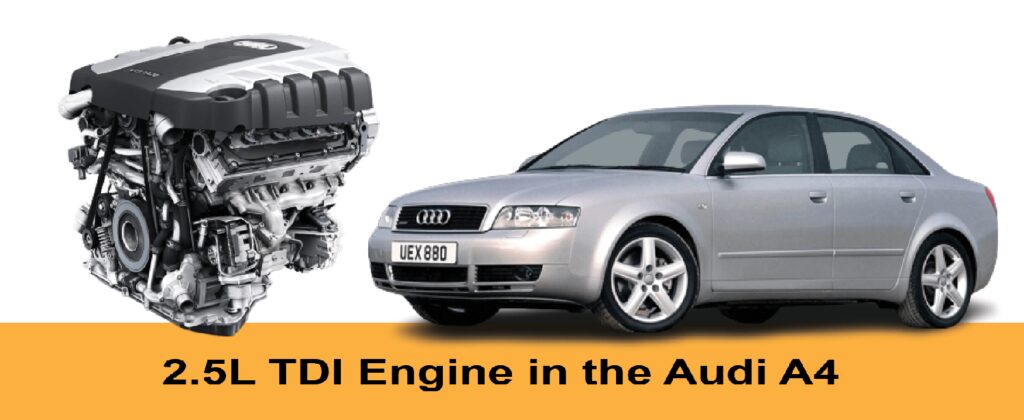
Audi vehicles using the 2.5L TDI
- Audi A4
- Audi A6
- Audi Allroad
- Audi TT
Audi engines to avoid - 2.7L V6 Biturbo
The Audi 2.7L V6 Biturbo engine was a high-performance powerplant manufactured between 1997 and 2005. This engine produces a significant torque.
It has two turbochargers as well as advanced engine management technology. This allows the 2.7L V6 Biturbo to produce up to 380 horsepower and 325 lb-ft of torque, making it one of the most powerful engines available at the time.
Let’s highlight more features..
2.7L V6 Biturbo features
This engine was loaded with advanced technology and key features such as
- High-pressure fuel pump for improved fuel delivery.
- Aluminum block and heads for reduced weight and improved performance.
- Electronic throttle for improved throttle response.
- Oil cooler for improved engine cooling and longevity.
- Forged crankshaft and connecting rods for increased durability.
- Lightweight pistons for reduced reciprocating mass and improved engine response.
- Low-friction piston rings for reduced wear and improved efficiency.
- Hydraulic lifters for reduced valvetrain noise and improved durability.
- Advanced knock sensors for improved engine protection
However, the engine’s tight engine bay, twin turbos, and extremely high under-hood temperatures resulted in a very unreliable engine.
2.7L V6 Biturbo Engine Problems
This engine was plagued with a multitude of issues that could potentially cause headaches for its owners. Some of the problems that have been reported include reduced oil pressure resulting from a faulty oil pressure switch, which could lead to engine damage if not addressed promptly.
Throttle body failure – this problem resulted in poor throttle response and engine performance.
Turbocharger failure due to oil starvation, bearing wear, or compressor wheel damage is also a common problem, as is carbon buildup on the intake valves, which can lead to reduced performance.
The problems didn’t end there:-
- Ignition coil failure
- Coolant leaks caused by failed gaskets or damaged hoses
- Crankshaft position sensor failure leading to misfires
- Cooling system failure caused by failed water pumps, leaking radiators, and damaged hoses.
In addition to these issues, owners have also reported oil leaks around the valve covers and camshaft seals, valve cover gasket failure, mass airflow sensor failure, camshaft wear, timing belt failure, fuel pump failure, and oil sludge build-up. It’s clear that this engine has its fair share of problems, and owners should be aware of these issues in order to address them promptly and avoid costly repairs down the road.

Audi vehicles using the 2.7L V6 Biturbo
Among the most notable Audi vehicles equipped with this engine are:
- Audi A4 B5 generation from 1998 to 2001 in both sedan and Avant (wagon) variants
- Audi S4 B5 generation from 1998 to 2002
- Audi RS4 which was produced from 1999 to 2001
- Audi Allroad C5 generation Audi Allroad from 2000 to 2005
- Audi A6 C5 generation Audi A6 from 1999 to 2004
Audi engines to avoid - 3.0 TDI
The 3.0 TDI engine is one of Audi’s most impressive powertrains. With its advanced design, impressive technology, and ample torque, this engine has won a slew of fans among Audi enthusiasts worldwide.
The Audi 3.0 TDI, on the other hand, is not without its quirks and challenges. There are a few potential pitfalls that owners should be aware of, ranging from problems with the high-pressure fuel pump to carbon buildup in the intake system, and we’ll look into them shortly.
3.0 TDI Engine Problems
This powerful engine has its share of issues that can leave even the most seasoned Audi enthusiasts perplexed. Expect to encounter the following::-
- Engine control module software flaws cause a variety of issues, including reduced power and potential engine damage caused by moisture and voltage spikes.
- Failure of the fuel pressure regulator due to debris buildup and electrical faults
- Transmission problems characterized by slipping and rough shifting
- Failure of the Serpentine Belt: If the serpentine belt fails, the accessories it drives may cease to function, resulting in a loss of power steering, electrical power, and air conditioning.
- When a throttle body fails due to wear and tear, clogging, electrical problems, or mechanical problems, the system typically goes into limp mode and turns off the engine to stop additional damage.
- Excessive oil consumption, blue smoke coming from the exhaust, a rough idle, and decreased engine performance are signs of valve stem seal failure.
- Engine hesitancy, rough idling, misfires, loss of power, and the dreaded check engine light are signs of an ignition coil failure.
- Failure of the crankshaft position sensor results in difficult cold-weather starts, lower power and acceleration, stalling, and the check engine light. Failure of the glow plug could result in engine damage.
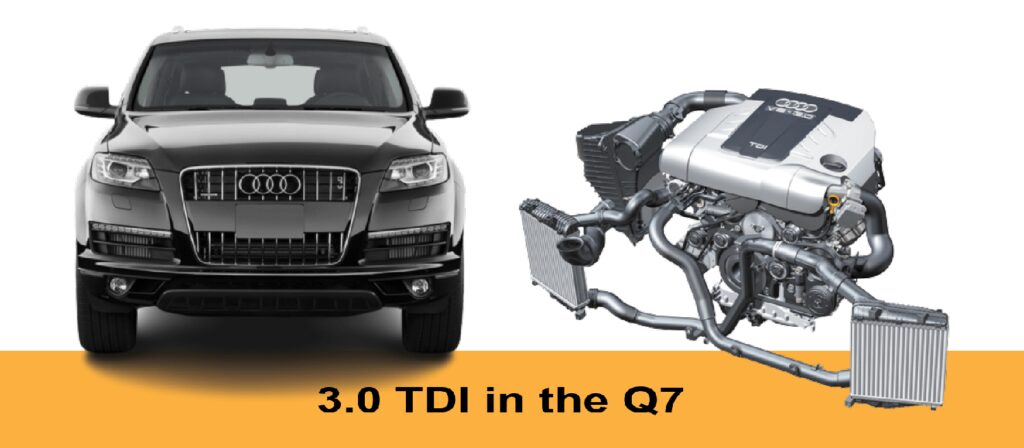
Audi vehicles using the 3.0 TDI
Some of the Audi models that use the 3.0 TDI engine include:
- Audi A4 (B8) – 2008-2012
- Audi A6 (C6) – 2004-2011
- Audi A7 (C7) – 2011-2018
- Audi A8 (D3) – 2004-2010
- Audi Q5 (8R) – 2008-2017
- Audi Q7 (4L) – 2006-2015
- Audi SQ5 (8R) – 2013-2017
Audi engines to avoid - 4.2L V8
Under the hood, this engine packs a powerful punch. Its eight cylinders produce a lot of horsepower, allowing you to accelerate quickly and cruise down the highway like a boss. The 4.2L V8 is built to last, but it’s not without flaws.
But first, let’s take a look at the engine’s highlights.
Notable features of the 4.2L V8
Some general features that are commonly associated with this type of engine include:
- 4.2 liters displacement
- Four valves per cylinder for a total of 32 valves
- Dual overhead camshafts (DOHC) for precise valve control
- High compression ratio for increased power output
- Closed-loop cooling system for better temperature control
- Advanced ignition timing
- Variable intake manifold for improved airflow
- Engine oil pressure sensor for monitoring engine health
- Limited slip differential for improved traction and handling
- Performance-oriented air intake system
4.2L V8 Engine Problems
Unfortunately, the list of issues associated with this engine is lengthy. We’ll try to keep it brief.
Everything from oil leaks to timing chain tensioner failure is covered. This engine has them all:
- Coolant leaks from the water pump or thermostat housing
- Intake manifold gasket failure causing vacuum leaks
- Blown head gasket causing coolant loss or engine overheating
- Cracked engine block due to overheating or other causes.
- Fuel system problems such as clogged fuel injectors or failing fuel pump
- Engine knocking or pinging due to poor fuel quality or improper timing
- Oil leaks from valve covers or rear main seal
- Timing chain tensioner failure leading to engine damage

Audi vehicles using the 4.2L V8 engine
- Audi A8 1997 – 2010
- Audi S4 2004 – 2008
- Audi RS4 2006 – 2008
- Audi Q7 2007 – 2010
- Audi R8 2008 – 2012
Wrapping up
Even while we agree that Audi makes wonderful automobiles, the engines we’ve spoken about can have problems, therefore by spotlighting them, we don’t want to disparage all the engines in any category.
The purpose of this is to advise secondary market purchasers on what Audi engines to avoid.
Related articles
4 Reliable Audi Engines
We investigate the complex world of Audi engines to determine – Reliable Audi Engines.
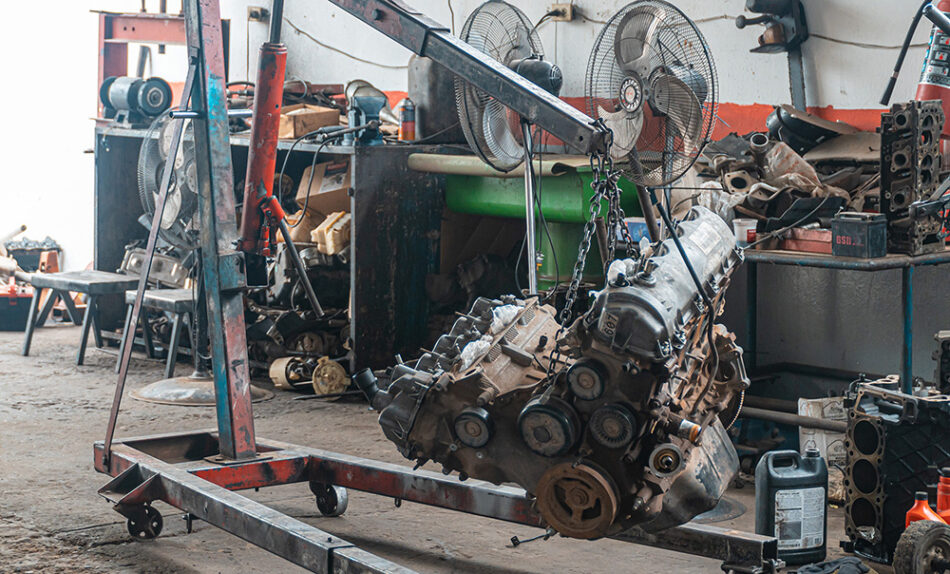
Worst Engines To Avoid
To pick out the Worst Engines To Avoid in the automotive world requires experience and knowledge.

